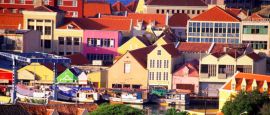Curaçao Health Care and Vaccinations
| Title | Special precautions |
|---|---|
| Diphtheria |
Sometimes |
| Hepatitis A |
Yes |
| Malaria |
No |
| Rabies |
Sometimes |
| Tetanus |
Yes |
| Typhoid |
Sometimes |
| Yellow Fever |
No* |
There are three hospitals on Curaçao as well as some medical centres. The largest, St Elizabeth, is well equipped. Health insurance is recommended.
Mains water on the island is distilled from sea water and is safe to drink. Bottled mineral water is widely available. Milk is pasteurised and dairy products are safe for consumption. Local meat, poultry, seafood, fruit and vegetables are generally considered safe to eat.
Do you have any Feedback about this page?
© 2026 Columbus Travel Media Ltd. All rights reserved. No part of this site may be reproduced without our written permission, click here for information on Columbus Content Solutions.








 You know where
You know where